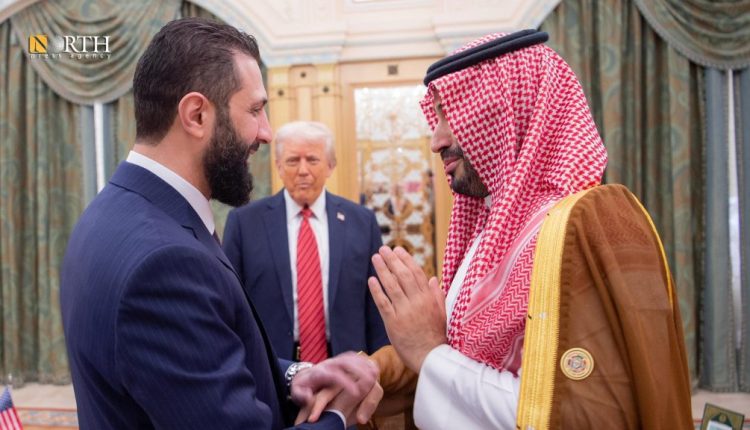
By Ahmad Othman
QAMISHLI, Syria (North Press) – U.S. President Donald Trump indicated on Wednesday that Syria’s Transitional President, Ahmad al-Sharaa, is open to signing the Abraham Accords, which establish peace with Israel. The statement followed a landmark meeting between the two leaders in Riyadh—the first of its kind between an American and Syrian president in over 25 years.
Speaking to reporters aboard Air Force One en route from Riyadh to Doha, Trump said: “I told [Sharaa], I hope you’re going to join [the Abraham Accords] once you’re straightened out and he said yes. But they have a lot of work to do.”
Earlier, Trump had confirmed that Washington is considering normalizing relations with the new Syrian government, suggesting that the meeting with al-Sharaa could mark the beginning of that process.
The Abraham Accords refer to a series of U.S.-brokered peace agreements between Israel and several Arab nations. First announced in August 2020, the accords initially included the UAE, Bahrain, Morocco, and Sudan. The initiative aims to reshape regional alliances and promote peace through diplomatic and economic cooperation.
Growing U.S. interest in regional normalization
In March, U.S. Special Envoy to the Middle East Steve Witkoff revealed that normalizing relations between Israel and both Syria and Lebanon is a serious prospect, noting that Syria has distanced itself from Iranian influence.
“Lebanon, by the way, could actually mobilize and come into the Abraham Peace Accords, as could potentially Syria,” Witkoff told an event in Washington for the American Jewish Committee. “So, so many profound changes are happening.”
He added that such operational dominance, if coupled with the disbanding of militant groups, could pave the way for comprehensive regional normalization. “Imagine if Lebanon normalized its relations with Israel, then Syria did the same, and Saudi Arabia signed a normalization agreement with Israel after achieving peace in Gaza. This would be a precondition for normalization with Saudi Arabia.”
UAE reportedly facilitating backchannel talks
Reuters later reported that the United Arab Emirates had opened a discreet communication channel between Syria and Israel, coinciding with Syria’s efforts to garner regional support amid escalating tensions with Tel Aviv.
According to a well-placed source, a senior Syrian security official, and a regional intelligence officer, the indirect discussions are focused on security and intelligence coordination and confidence-building measures.
The backchannel reportedly gained traction following al-Sharaa’s visit to the UAE on April 13. Though the UAE publicly denied its involvement, sources told Reuters that Emirati, Syrian, and former Israeli intelligence figures were all engaged in the effort.
The talks were confirmed by al-Sharaa during a joint press conference with French President Emmanuel Macron in Paris, where he acknowledged that “indirect negotiations through intermediaries” were underway to de-escalate tensions and prevent the situation from spiraling out of control.
Reuters also noted that mediation efforts occurred shortly before Israeli airstrikes in Syria, including a raid just 500 meters from the presidential palace in Damascus.
The new Syrian administration has taken deliberate steps to signal that it poses no threat to Israel. Authorities have engaged with Jewish community representatives in Damascus and abroad and recently arrested two senior members of Palestinian Islamic Jihad involved in the Oct. 7, 2023, attack on Israel.
Despite growing speculation about Syria’s potential inclusion in the Abraham Accords, analysts remain cautious. Former U.S. diplomat James Jeffrey told Sky News that “normalization with Israel in exchange for sanctions relief is far from certain,” even though it is reportedly being discussed.
As Syria stands at a pivotal crossroads amid rising American demands and a rapidly shifting regional landscape, Trump has made clear his intent to bring more countries into the fold of the Abraham Accords. Whether Syria joins remains uncertain, but signals from both sides suggest the door to diplomacy is now ajar.
